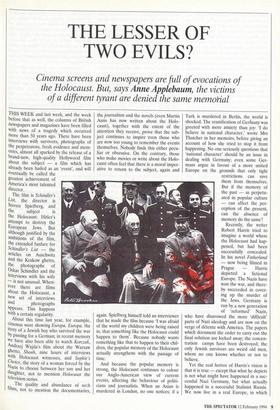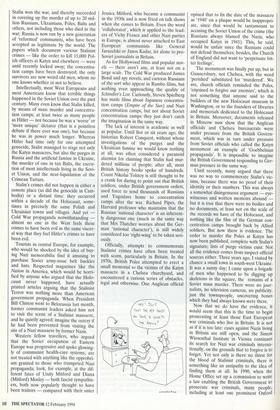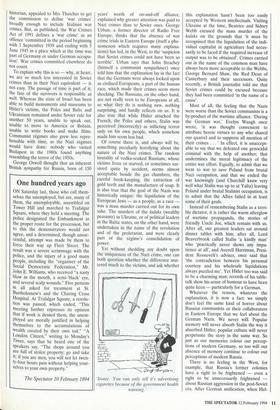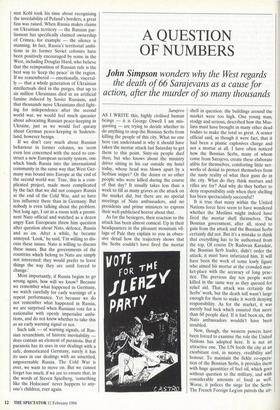THE LESSER OF TWO EVILS?
Cinema screens and newspapers are full of evocations of
the Holocaust. But, says Anne Applebaum, the victims
of a different tyrant are denied the same memorial
THIS WEEK and last week, and the week before that as well, the columns of British newspapers and magazines have been filled with news of a tragedy which occurred more than 50 years ago. There have been interviews with survivors, photographs of the perpetrators, fresh evidence and mem- ories, almost all sparked by the release of a
The film is Schindler's List, the director is Steven Spielberg, and the subject is the Holocaust: Hitler's attempt to destroy the European Jews. But although justified by the ambitions of the film, the extended fanfare for Schindler's List — the articles on Auschwitz and the Krakow ghetto, the photographs of Oskar Schindler and the interviews with his wife — is not unusual. When- ever there are films about the Holocaust, a new set of interviews
and photographs appears. This happens with a certain regularity.
About this time last year, for example, cinemas were showing Europa, Europa, the story of a Jewish boy who survived the war by passing for a German; in recent memory we have also been able to watch Korczak, Andrzej Wajda's film about the Warsaw ghetto, Shoah, nine hours of interviews with Holocaust witnesses, and Sophie's Choice, the story of a woman forced by the Nazis to choose between her son and her daughter, not to mention Holocaust the television series.
The quality and abundance of such films, not to mention the documentaries, the journalism and the novels (even Martin Amis has now written about the Holo- caust), together with the extent of the attention they receive, prove that the sub- ject continues to inspire 'even those who are now too young to remember the events themselves. Nobody finds this either pecu- liar or obsessive. On the contrary, those who make movies or write about the Holo- caust often feel that there is a moral imper- ative to return to the subject, again and again. Spielberg himself told an interviewer that he made the film because 'I was afraid of the world my children were being raised in, that something like the Holocaust could happen to them'. Because nobody wants something like that to happen to their chil- dren, the popular memory of the Holocaust actually strengthens with the passage of time.
And because the popular memory is strong, the Holocaust continues to colour our Anglo-American view of current events, affecting the behaviour of politi- cians and journalists. When an Asian is murdered in London, no one notices; if a
Turk is murdered in Berlin, the world is shocked. The reunification of Gerfnany was greeted with more anxiety than joy: 'I do believe in national character,' wrote Mrs Thatcher in her memoirs, before giving an account of how she tried to stop it from happening. No one seriously questions that `national character' should be an issue in dealing with Germany; even some Ger- mans argue in favour of a more united Europe on the grounds that only tight restrictions can save them from themselves. But if the memory of the past — as perpetu- ated in popular culture — can affect the per- ception of the present, can the absence of memory do the same?
final solution are locked away; the concen- tration camps have been destroyed; the only Jewish survivors are weird old men, whom no one knows whether or not to believe.
Yet the real horror of Harris's vision is that it is true — except that what he depicts is not what might have happened in a suc- cessful Nazi Germany, but what actually happened in a successful Stalinist Russia. We now live in a real Europe, in which
Stalin won the war, and thereby succeeded in covering up the murder of up to 20 mil- lion Russians, Ukrainians, Poles, Balts and others, not including those who died in the war; Russia is now run by a new generation of 'reformed' communists, who have been accepted as legitimate by the world. The papers which document various Stalinist crimes — like the order to kill 15,000 Pol- ish officers at Katyn and elsewhere — were until recently locked away; the concentra- tion camps have been destroyed; the only survivors are now weird old men, whom no one knows whether or not to believe.
Intellectually, most West Europeans and most Americans know that terrible things happened in the Soviet Union over the past century. Many even know that Stalin killed, by means of mass murder and concentra- tion camps, at least twice as many people as Hitler — not because he was a 'worse' or `more unique' dictator (that is a pointless debate if there ever was one), but because he was in power much longer. Whereas Hitler had time only for one attempted genocide, Stalin managed to stage not only the Katyn massacres, but also the purges in Russia and the artificial famine in Ukraine, the murder of one in ten Balts, the execu- tion of most intellectuals living in the Sovi- et Union, and the near-liquidation of the Crimean Tartars.
Stalin's crimes did not happen in either a remote place (as did the genocide in Cam- bodia) or a distant time: they occurred within a decade of the Holocaust, some- times in precisely the same Polish and Ukrainian towns and villages. And yet Cold War propaganda notwithstanding almost no one in the West feels these crimes to have been evil in the same viscer- al way that they feel Hitler's crimes to have been evil.
Tourists in central Europe, for example, who would be shocked by the idea of buy- ing Nazi memorabilia find it amusing to purchase Soviet army-issue belt buckles and hats. Respected magazines like the Nation in America, which would be horri- fied by anyone who argued that the Holo- caust never happened, have actually printed articles arguing that the Stalinist Terror was nothing more than American government propaganda. When President Bill Clinton went to Belorussia last month, former communist leaders asked him not to visit the scene of a Stalinist massacre, and he quietly agreed; imagine the outcry if he had been prevented from visiting the site of a Nazi massacre by former Nazis.
Western fellow travellers, who argued that the Soviet occupation of Eastern Europe was progressive and spoke glowing- ly of communist health-care systems, are not treated with anything like the opprobri- um granted to those who trumpeted Nazi propaganda; look, for example, at the dif- ferent fates of Unity Mitford and Diana (Mitford) Mosley — both fascist sympathis- ers, both now popularly thought to have been traitors — compared with their sister Jessica Mitford, who became a communist in the 1930s and is now feted on talk shows when she comes to Britain. Even the word `collaborator', which is applied to the lead- ers of Vichy France and other Nazi parties in Europe, is almost never attached to East European communists like General Jaruzelski or Janos Kadar, let alone to pro- Soviet journalists in Britain.
As for Hollywood films and popular nov- els — there aren't any, at least not on a large scale. The Cold War produced James Bond and spy novels, and cartoon Russians of the sort who appear in Rambo films, but nothing even approaching the quality of Schindler's List. Curiously, Steven Spielberg has made films about Japanese concentra- tion camps (Empire of the Sun) and Nazi concentration camps, but not about Soviet concentration camps: they just don't catch the imagination in the same way.
The lack of interest is academic as well as popular. Until five or six years ago, the historian Robert Conquest, without whose investigations of the purges and the Ukrainian famine we would know nothing at all, was often considered a paranoid alarmist for claiming that Stalin had mur- dered millions of people; after all, most British history books spoke of hundreds. Count Nikolai Tolstoy is still thought to be a crank for daring to point out that British soldiers, under British government orders, used force to send thousands of Russians and Yugoslays home to concentration camps after the war. Richard Pipes, the Harvard professor who maintains that the Russian 'national character' is an inherent- ly dangerous one (much in the same way that Mrs Thatcher worries about the Ger- man `national character'), is still widely considered too `right-wing' to be taken seri- ously.
Officially, attempts to commemorate Stalinist crimes have often been treated with scorn, particularly in Britain. In the 1970s, British Poles attempted to erect a small memorial to the victims of the Katyn massacre in a Chelsea churchyard, and encountered a curious series of obstacles, legal and otherwise. One Anglican official opined that to fix the date of the massacre as '1940' on a plaque would be inappropri- ate, since that would be tantamount to accusing the Soviet Union of the crime (the Russians always blamed the Nazis, who occupied Katyn in 1941). This, he said, would be unfair since the Russians could not defend themselves; besides, the Church of England did not want to 'perpetuate bit- ter feelings'.
The monument was finally put up, but in Gunnersbury, not Chelsea, with the word `perished' substituted for 'murdered'. We are, church officials reminded the Poles, `enjoined to forgive our enemies', which is not something that anyone said to the builders of the new Holocaust museum in Washington, or to the founders of libraries and memorials dedicated to the Holocaust in Britain. Moreover, documents released in Moscow now show that the Anglican officials and Chelsea bureaucrats were under pressure from the British Govern- ment, which was in turn under pressure from Soviet officials who called the Katyn monument an example of `Goebbelsian propaganda'. It is impossible to imagine the British Government responding to Ger- man pressure in the same way.
Until recently, many argued that there was no way to commemorate Stalin's vic- tims, because there was no proof of their identity or their numbers. This was always a somewhat disingenuous argument — eye- witnesses and written memoirs abound but it is true that there were no bodies and no documents, at least not on the scale of the records we have of the Holocaust, and nothing like the film of the German con- centration camps brought back by Allied soldiers. But now there is evidence. The order to murder the Poles at Katyn has now been published, complete with Stalin's signature; lists of purge victims exist. Not all the evidence comes from suspect official sources either. Three years ago. I visited by chance a small town in south-west Ukraine. It was a sunny day; I came upon a brigade of men who happened to be digging up skeletons in the square, the remains of a Soviet mass murder. There were no jour- nalists, no television cameras, no publicity, just the townspeople, uncovering bones which they had always known were there.
Now that we do have the evidence, it would seem that this is the time to begin prosecuting at least those East European war criminals who live in Britain. It is not as if it is too late: cases against Nazis living in Britain are still open, and the Simon Wiesenthal Institute in Vienna continues its search for Nazi war criminals interna- tionally, on the grounds that to forgive is to forget. Yet not only is there no thirst for the blood of Stalinist criminals, there is something like an antipathy to the idea of finding them at all. In 1990, when the Home Office set up a commission to write a law enabling the British Government to prosecute war criminals, many people, including at least one prominent Oxford historian, appealed to Mrs Thatcher to get the commission to define 'war crimes' broadly enough to include Stalinist war crimes. But, as published, the War Crimes Act of 1991 defines a 'war crime' as an offence 'committed in the period beginning with 1 September 1939 and ending with 5 June 1945 in a place which at the time was part of Germany or under German occupa- tion'. War crimes committed elsewhere do not count.
To explain why this is so — why, at heart, we are so much less interested in Soviet crimes than in their Nazi equivalent — is not easy. The passage of time is part of it; the fate of the survivors is responsible as well. Whereas the state of Israel has been able to build monuments and museums to Hitler's victims, the Poles and Baits and Ukrainians remained under Soviet rule for another 50 years, unable to speak out, unable to move to America or Britain, unable to write books and make films. Communist regimes also grew less repre- hensible with time, as the Nazi regimes would have done: nobody who visited Budapest in the 1980s found anything resembling the terror of the 1950s.
George Orwell thought that an inherent British sympathy for Russia, born of 150 years' worth of on-and-off alliance, explained why greater attention was paid to Nazi crimes than to Soviet ones. George Urban, a former director of Radio Free Europe, thinks that the absence of war crime trials in Eastern Europe (itself a phe- nomenon which requires many explana- tions) has led, in the West, to the 'suspicion that Soviet crimes could not have been so terrible'. Urban says that John Strachey (himself a communist sympathiser) once told him that the explanation lay in the fact that the Germans were always looked upon as civilised Europeans, a part of the human race, which made their crimes seem more shocking. The Russians, on the other hand, are not really seen to be Europeans at all, so what they do is nothing new, nothing surprising, and hardly reflects on us. It is also true that while Hitler attacked the French, the Poles and others, Stalin was perceived (incorrectly) as inflicting terror only on his own people, which somehow made him seem less bad.
Of course there is, and always will be, something peculiarly horrifying about the nature of the Nazi crimes. The random brutality of vodka-soaked Russians, whose victims froze or starved, or sometimes sur- vived quite by accident, seems almost acceptable beside the gas chambers, the careful book-keeping, the extraction of gold teeth and the manufacture of soap. It is also true that the goal of the Nazis was historically unique: the liquidation of the European Jews — as a people, as a race was a mass murder carried out for its own
sake. The murders of the kulaks (wealthy
peasants) in Ukraine, or of political leaders in the Baltic states, on the other hand, were undertaken in the name of the revolution and of the proletariat, and were clearly part of the regime's consolidation of power.
Yet without shedding any doubt upon the uniqueness of the Nazi crime, one can both question whether the difference mat- tered much to the victims, and ask whether 'Ironic. You can only tell its advertising cigarettes because of the government health warning.' this explanation hasn't been too easily accepted by Western intellectuals. Visiting Ukraine at the time, Beatrice and Sidney Webb excused the mass murder of the kulaks on the grounds that 'it must be recognised that the liquidation of the indi- vidual capitalist in agriculture had neces- sarily to be faced if the required increase of output was to be obtained'. Crimes carried out in the name of the common man have always been more acceptable to the Webbs, George Bernard Shaw, the Red Dean of Canterbury and their successors. Quite recently, a British journalist told me that Soviet crimes could be excused because they had been committed 'in the name of a cause'.
Most of all, the feeling that the Nazis were worse than the Soviet communists is a by-product of the wartime alliance. 'During the German war,' Evelyn Waugh once wrote, 'it was thought convenient to attribute heroic virtues to any who shared our quarrel and to suppress all mention of their crimes . . . ' In effect, it is unaccept- able to say that we defeated one genocidal criminal with the help of another; that undermines the moral legitimacy of the entire war effort. Equally, to admit that we went to war to save Poland from brutal Nazi occupation, and that we ended the war knowingly (and Churchill knew very well what Stalin was up to at Yalta) leaving Poland under brutal Stalinist occupation, is to admit that the Allies failed in at least some of their goals.
Instead of remembering Stalin as a terri- ble dictator, it is rather the warm afterglow of wartime propaganda, the stories of friendly Uncle Joe, which remain with us. After all, our greatest leaders sat around dinner tables with him; after all, Lord Beaverbrook called Stalin 'a kindly man' who 'practically never shows any impa- tience at all', and Averell Harriman, Presi- dent Roosevelt's adviser, once said that `the contradiction between his personal courtesy and his wholesale liquidations always puzzled me'. Yet Hitler too was said to be a charming man; records of his table- talk show his sense of humour to have been quite keen — particularly for a German.
Whatever the reason, whatever the explanation, it is now a fact: we simply don't feel the same kind of horror about Russian communists or their collaborators in Eastern Europe that we feel about the German Nazis. We never will. Popular memory will never absorb Stalin the way it absorbed Hitler; popular culture will never perpetuate the story in the same way. So just as our memories colour our percep- tions of modern Germany, so too will our absence of memory continue to colour our perceptions of modern Russia.
There is no feeling in the West, for example, that Russia's former colonies have a right to be frightened — even a right to be unnecessarily frightened about Russian aggression in the post-Soviet era. After German unification, when Hel-
mut Kohl took his time about recognising the inviolability of Poland's borders, a great fuss was raised. When Russia makes claims on Ukrainian territory — the Russian par- liament has specifically claimed ownership of Crimea, for example — the silence is stunning. In fact, Russia's territorial ambi- tions in its former Soviet colonies have been positively encouraged by some in the West, including Douglas Hurd, who believe that the reimposition of Russian rule is the best way to 'keep the peace' in the region. If we remembered — emotionally, visceral- ly — that a whole generation of Ukrainian intellectuals died in the purges, that up to six million Ukrainians died in an artificial famine induced by Soviet Russians, and that thousands more Ukrainians died fight- ing for independence after the second world war, we would feel much queasier about advocating Russian peace-keeping in Ukraine, just as we would feel queasy about German peace-keeping in Sudeten- land, however benign.
If we don't care much about Russian behaviour in former colonies, we seem even less concerned with the need to con- struct a new European security system, one which binds Russia into the international community in the same way that West Ger- many was bound into Europe at the end of the second world war. True, this is a com- plicated project, made more complicated by the fact that we did not conquer Russia at the end of the Cold War, and so have less influence there than in Germany. But nobody is even talking about the problem. Not long ago, I sat in a room with a promi- nent Nato official and watched as a dozen angry East Europeans threw him question after question about Nato, defence, Russia and so on. After a while, he became annoyed. 'Look,' he said, 'I'm willing to dis- cuss these issues. Nato is willing to discuss these issues. But the governments of the countries which belong to Nato are simply not interested: they would prefer to leave things the way they are until forced to change.'
Most importantly, if Russia begins to go wrong again, how will we know? Because we remember what happened in Germany, we watch carefully for early warnings of a repeat performance. Yet because we do not remember what happened in Russia, we are surprised when Russians vote for a nationalist with openly imperialist ambi- tions, and do not know whether to take this as an early warning signal or not.
Such talk — of warning signals, of Rus- sian revanchism, of historic inevitability does contain an element of paranoia. But if
paranoia has its uses in our dealings with a
safe, domesticated Germany, surely it has its uses in our dealings with an unsettled, ungovernable Russia. The Cold War is over, we want to move on. But we cannot forget too much, if we are to ensure that, in the words of Steven Spielberg, 'something like the Holocaust' never happens to any- one's children, ever again.





















































 Previous page
Previous page